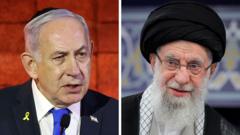Israel has intensified its military operations against Iran, employing new strategies targeting key military personnel and infrastructure, which has raised concerns about a potential escalated response from Tehran.
Israel's Strategic Assault on Iran: A Calculated Move

Israel's Strategic Assault on Iran: A Calculated Move
Unprecedented military actions by Israel against Iran signal a determined effort to cripple Iranian leadership and military capabilities.
Israel's military campaign against Iran has entered a new phase, marked by an intensity and breadth not seen in previous operations. Following a strategy reminiscent of its offensive against Hezbollah in Lebanon, Israel has not only targeted Iranian missile facilities but also aimed to eliminate high-ranking officials within Iran's military infrastructure. This tactic, aimed at decapitating a central leadership figure, previously dealt Hezbollah a significant blow, raising questions about the future capabilities of Iran’s own military response.
Recent footage from Tehran illustrates the specific nature of these strikes, drawing parallels with earlier Israeli actions in Beirut that led to the demise of Hezbollah's commander. Although no major Iranian figure such as Supreme Leader Ali Khamenei has been struck, the reported killing of military chief Hossein Salami and several key nuclear scientists highlights the unprecedented scale of damage inflicted upon Iran's elite.
Israeli Prime Minister Benjamin Netanyahu hinted that these operations might be ongoing, indicating a strategic escalation to reinforce Israel’s national security. His assertions emphasize the imminent threat posed by Iran's advancing nuclear capabilities, with military officials claiming that Iran could potentially produce enough fissile material for up to 15 nuclear weapons swiftly.
The timing of these operations appears deliberate, coming just as U.S. negotiations with Iran over its nuclear program were set to resume. Netanyahu likely viewed this as an opportune moment to derail any prospective agreement he considers unfavorable. Furthermore, Israel’s recent actions could be partially motivated by an assessment that its regional adversaries, particularly Hezbollah, have been sufficiently weakened.
The forthcoming days are crucial in determining whether Israel's strategy proves viable or signals a critical miscalculation that could elicit a more robust reaction from Tehran. As this situation develops, the global community watches closely, anticipating the ramifications of this heightened conflict in the Middle East.




















